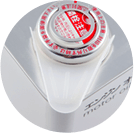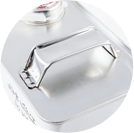
排出量の削減
エンジン寿命の延長
燃料の節約
いくつかの重要な利点を持っている日本のエンジンオイルの最新の規格。GF-6規格は検討中で未だ施工されてない。
安定した品質とコストの最適化を維持するためKANRI KENSAという生産方針の適応。
その生産方針に従って、オイルTAKAYAMAは生産の各工程で10段階の品質検査を行ってます。
エンジンオイル配合の作成・テストの段階
ブリキ容器の生産段階
ブリキ容器の気密性テストの段階
ブリキ容器用キャップ生産の段階
ロジスティックテストの段階
原料検査の段階
エンジンオイル(半製品)生産の段階
充填前の半製品検査の段階
半製品の容器への充填の段階
完成品の検査段階
世界中の人達は日本の技術とは何かを良く承知してる、しかしながら、限られた専門家だけがすべてのニュアンスを理解します。何よりも先に、品質管理に対する特別な哲学を持った高度なアプローチと生産サイクルの各段階での品質管理の方針である。
この包装形態は、日本のモーターオイルに使うユニークで独特な方法です。利便性、実用性および外観はエンジンオイルTakayamaの製造時の高基準を強調しています。

正確なオイル
注ぎ口

快適で丈夫な
キャリーハンドル